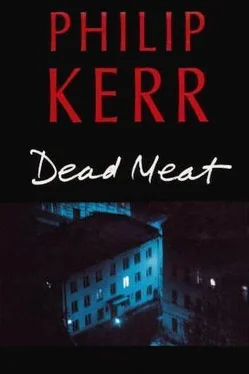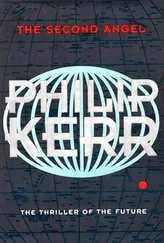Grushko was right about the ubiquity of Mafia killings, although the next one happened sooner than even he might have expected. Less than two hours after returning to the Big House, Grushko and I were summoned to the scene of yet another murder. Meanwhile Nikolai and Sasha had gone off to look for Sultan Khadziyev.
It was seven o’clock in the evening when we drove up to the gate of the Alexander Nevsky Monastery. Outside the Moskow Hotel on the other side of the road, a small jazz band was playing ‘When the Saints Go Marching In’.
‘Sounds appropriate,’ said Grushko.
We waved our identity cards in the tired faces of the young militiamen who were holding back a crowd of curious bystanders and made our way along a cobbled path that was flanked by the walls of two cemeteries — the Lazarus and the Tivkin, where the bodies of Dostoevsky, Rimsky-Korsakov and Tchaikovsky were buried.
‘Well,’ said Grushko as we approached the terracotta-coloured monastery that lay on the other side of a small moat, ‘you can’t say that we haven’t been showing you our beautiful city.’
The small bridge across the moat was busy with experts and local detectives, one of whom, seeing Grushko, detached himself from the rest and came over to talk to us.
‘What have you got?’ said Grushko.
‘Another churki killing,’ the detective said negligently and spat across the parapet into the water. This one won’t be walking up Rustaveli Avenue again.’
‘A Georgian?’
The detective nodded and led us on to the bridge where, slumped against a wall, with a hole the size of a saucer in his chest, lay the body of a handsome young man.
‘Name of Merab Laventrivich Zodelava,’ he said. ‘A drug-dealer, apparently. His pockets were full of wheels.’ He showed us a plastic bag containing lots of pills. ‘Amphetamines, I should say. The whores buy them to keep awake on the job. Anyway, it seems like he was standing here about to make a sale when this other churki showed up and blasted a window in him with a sawn-off. Both barrels, it looks like. Makes the autopsy easy, I suppose.’
‘Any witnesses?’
‘Just the one. But don’t get too excited.’ The detective jerked his head at an old man who was sitting patiently on an empty beer crate under the watchful eye of a militiaman. The man had one leg.
‘See that one leg?’ he said. ‘Well, he’s got just the one eye to match.’
‘Great,’ said Grushko.
‘He was here to beg a few copecks off the people going into the cathedral. I reckon the only reason the gunman didn’t pot the old man as well was because of those dark glasses he’s wearing. Probably thought there was no point in shooting a blind man.’
‘Did he give you a description?’ asked Grushko.
The detective flipped open his notebook.
‘It’s not much. He didn’t stare too much in case he got a dose of lead. “Well dressed, aged about thirty, dark hair, dark moustache, dark complexion”.’ He shrugged. ‘Like I said, a churki.’
‘What about the pipes?’ asked Grushko. ‘Did he take it with him?’
The detective shrugged.
‘Drag the moat anyway,’ Grushko ordered, ‘just in case he dumped it. And better check both cemeteries in case he tossed it over the wall on his way out.’
‘What’s the form on this one, sir?’ asked the detective. ‘Have we got another turf war on our hands? One of the scientific boys was saying something about a couple of Chechens getting their tickets to Allah this afternoon.’
‘I don’t know about a turf war,’ said Grushko, ‘but there’s plenty more blood where this lot came from.’
Vaja Ordzhonikidze’s funeral cortege represented a small fortune in motor vehicles: Mercedes, Saabs, Volvos, BMWs — there wasn’t one that would have been within the purchasing range of a whole syndicate of militiamen, always assuming that they were straight. Not in this lifetime.
I thought of my own battered Volga back in Moscow, awaiting a new head gasket from the factory in Nizhniy Novgorod, and cursed the luck that had made me an honest man. Well, almost an honest man. Honesty is not always so clear cut. The nature of what I do requires that sometimes I have, as Dostoevsky might say, a Double, to do things of which one disapproves, such as misplace some evidence, or look the other way. Or to search a man’s desk when he is out of his office and look for a sign of that man’s corruption: a bank book, a name in a diary, a letter, a receipt from an expensive restaurant. A man who might have worked alongside you and thinks of you as his friend. A lie can sometimes illuminate the truth, but this can be hard. Still, nobody ever said the world was perfect.
The cars came down Oktabrisky Prospekt and pulled up at the gate of the Smolensky Cemetery. Several well-built men in dark suits and white shirts jumped out and stared with paranoid expectancy in several directions. Satisfied that there were no likely threats in the area they squired their team leaders and bosses, the Georgian Mafia elite, out of the cars.
From the other side of the canal, on Decembrist’s Island, we watched the Georgian funeral through binoculars — Nikolai, Sasha, Dmitri our photographer and myself. Grushko was the last to arrive, with General Kornilov.
Grushko shot a look of puzzlement at Dmitri and then leaned towards Sasha.
‘Who’s he?’ he said. ‘Where’s Arkady, our usual man?’
‘Sick,’ said Sasha. ‘This is Dmitri.’
Grushko nodded uncertainly and watched Dmitri turning the focus on a huge telephoto lens.
‘You needn’t worry about him, sir,’ said Sasha. ‘He used to do surveillance work for the KGB, until he got made redundant.’
‘Oh? And what does he do now?’
‘Weddings, mostly.’
Grushko sighed and raised his binoculars.
‘Weddings,’ he muttered darkly.
A group of Georgians were taking Vaja out of the hearse. He lay on an open bier like Lenin, covered in flowers. They lifted him on to their broad shoulders and, preceded by a priest of the Georgian Orthodox Church reading from a prayer-book, his acolyte swinging a censer and a third man bearing an icon, the funeral party started to proceed into the cemetery.
‘That’s Dzhumber Gankrelidze,’ said Nikolai. The one straightening his tie. He’s the boss.’
The power-wind of Dmitri’s camera whirred busily.
‘It’s quite a show,’ observed the general. ‘It doesn’t much look as if they could have thought Vaja was an informer.’
‘This is nothing compared to the Little Gypsy’s funeral in Sverdlovsk last year,’ said Grushko. ‘Brought the whole town to a standstill.’
‘Yes,’ said Kornilov. ‘Gregory Tsyganov. Who was it killed him?’
‘Azerbaijanis.’
‘Still, it’s quite a show by our standards.’
‘And then, the year before that, there was Bosenko’s brother.’
‘The Black Swan? I’d forgotten that one.’
‘Blown up in his car, he was,’ said Grushko. ‘There was hardly enough of him left to fill a shoe box, let alone a coffin, but the Cossacks still gave him the brass handles.’ He smiled.
‘All right, Yevgeni,’ said Kornilov. ‘You’ve made your point.’ He didn’t enjoy taking lessons from Grushko. ‘Do we know where they’re holding the party afterwards?’
‘Our informers told us they’re going to a restaurant called Tblisi. It’s a little Georgian place on the other side of the Neva, in Petrogradsky Region. I’ve had the placed bugged, just in case they say anything coherent.’
The procession passed inside the cemetery and everyone lowered their binoculars. Dmitri started to wind back his film.
‘And what about this pimp?’ said Kornilov, lighting a cigarette. ‘The one who might have had a grudge against Mikhail Milyukin. Any sign of him yet?’
Читать дальше












